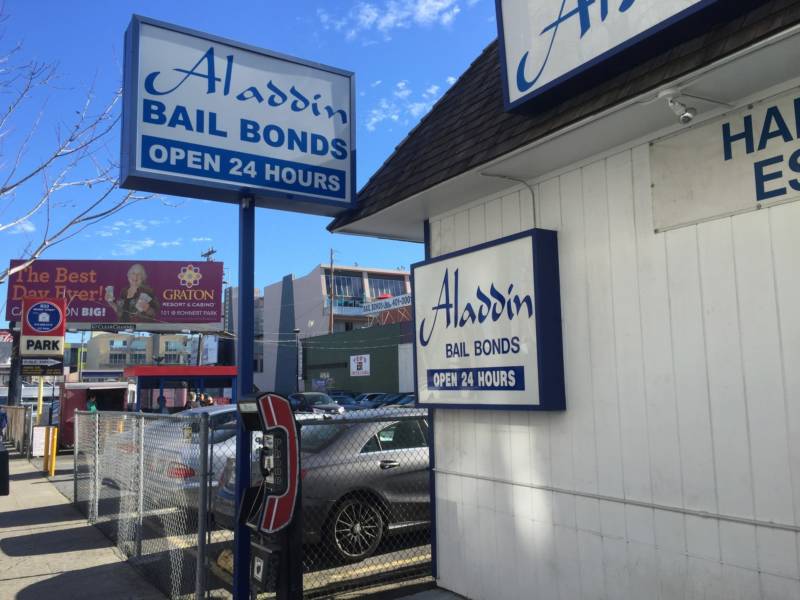San Francisco has reached a tentative settlement in a federal class-action lawsuit that provides an alternative to the city's prearraignment cash bail system.
San Francisco Reaches Tentative Settlement for Alternative to Cash Bail

U.S. District Judge Yvonne Gonzalez Rogers ruled in March that San Francisco's bail system deprives low-income defendants of their constitutional right to freedom before appearing in court. She found, as other courts have, that reliance on cash bail creates an unconstitutional inequality between affluent and poor arrestees.
Those who can afford to pay hundreds or thousands of dollars to guarantee they'll show up in court are released within 12 hours on average in San Francisco, according to court filings, but those who can't afford to pay may end up waiting in jail for several days before a judge decides whether they can be released pending trial.
"Justice is better served when decisions are based on the facts, not on the size of someone’s bank account," said San Francisco City Attorney Dennis Herrera in a statement. "Our proposal safeguards civil liberties by ensuring low-level cases are assessed quickly, and it protects public safety by guaranteeing no one accused of a serious or violent crime is released without judicial review."
State legislation to eliminate bail entirely — and replace it with a system that gives judges far more discretion — was signed last year by then-Gov. Jerry Brown but hasn't yet taken effect. That's because the bail industry collected enough signatures to place a referendum on the November 2020 ballot, asking voters to overturn the law.
The original lawsuit challenging San Francisco's bail system was brought in 2015 by Riana Buffin and Crystal Patterson, who were arrested separately in the city. Their time in jail came at a high cost.
Patterson was jailed for more than 24 hours on charges of assault, then promised to pay $15,000 plus interest to a bail agent so she could be released. Buffin spent almost two full days in jail on a charge of grand theft because she couldn't afford bail and lost her $10.25 an hour job at Oakland's airport as a result. Prosecutors dropped charges against both women.
Gonzalez Rogers was expected to issue a ruling on Aug. 23 on how the city should replace prearraignment cash bail. Instead, she asked the parties to brief her on what they believe San Francisco should do.
Under the proposed settlement filed Friday evening, instead of imposing pre-determined bail amounts, the Sheriff's department would perform a public safety assessment on prearraignment detainees within eight hours of a person’s identity being confirmed in the jail.
The court would review that assessment and make a decision on whether to release detainees on their own recognizance or keep them in custody. If no decision has been made within 18 hours of the person's identity being confirmed in jail, the recommendation from the public safety assessment would determine if the person is released. During those 18 hours, a law enforcement officer could extend the time frame by 12 hours.
"This is something that will protect public safety while protecting the rights of the individuals that are charged with crimes," said San Francisco Sheriff Vicki Hennessy.
In order to make the agreement possible, the Sheriff's department needs to expand its program that performs public safety assessments of prearraignment defendants to operate 24/7. It's not clear yet how much that would cost, but the settlement requires the Sheriff to try to get the Board of Supervisors to approve additional funding for the program within 90 days. If that doesn't happen, the settlement would be scrapped and the judge would rule on how to replace the prearraignment cash bail system, unless the parties both ask the judge to extend the timeline.
Harmeet Dhillon, lead attorney for the California Bail Agents Association which defended San Francisco's cash bail system in the original lawsuit, argues this agreement would actually take away rights from some defendants. She points to the fact that the San Francisco Superior Court hasn't agreed to hear the cases outside its normal business hours and law enforcement can extend the time frame that a public safety determination must be made in.
"The proposed elimination of bail and this imposition of this bureaucratic regime is actually a reduction in liberty for many arrestees," Dhillon said. "Without the court signing off that they're going to find judges to be around the clock hearing and ruling on these pretrial release recommendations people will be staying longer."
A spokesperson for the San Francisco Superior Court said the court did not have a comment.
Dhillon added she expects the settlement, if enacted, to be challenged in court.
The new rules would not apply to people accused of serious or violent felonies. Lawyers for the two women who brought the lawsuit have asked Gonzalez Rogers to rule on whether people charged with serious or violent felonies would be eligible for prearraignment judicial review. The city is not taking a position on the issue.
"After five years of litigation, we are relieved to see San Francisco's unequal bail system ending," said Executive Director of Equal Justice Under Law, Phil Telfeyan, in a statement. The non-profit organization, which advocates for criminal system equality, helped bring the lawsuit against the city.
"We hope that other cities and states will soon follow," Telfeyan said.
The settlement needs approval by the federal court and the city's Board of Supervisors. It would go into effect 90 days after the Board of Supervisors provides funding for the Sheriff's Department to do more public safety assessments.
Read the proposed settlement below.
